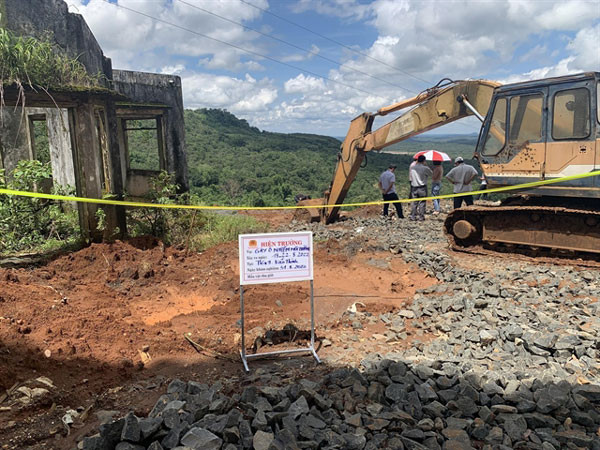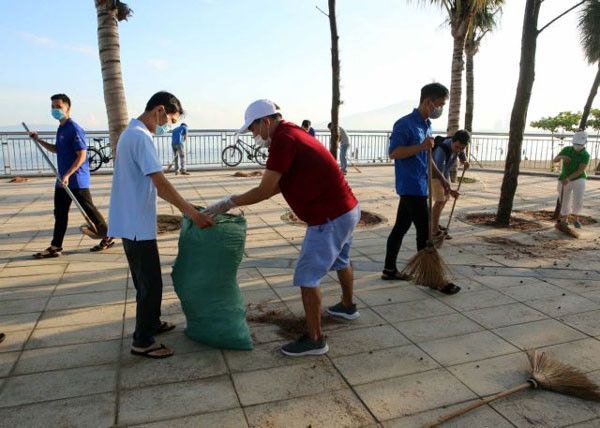
Violations
A recent report by the Ministry of Public Security said that climate change has become more complicated in recent years.
The pressure of socio-economic development and violations of laws related to environment, natural resources and food hygiene and safety have made the quality of the environment continue to be severely affected.
From 2016 to June this year, the police detected 156,328 violations by 173,010 people. As a result, the police prosecuted 2,129 cases with 3,147 people and given administrative violations for 142,908 cases with 149,459 people. The amount of administrative fine is over VND1.9 trillion (US$83.3 million).
At the fifth National Environment Conference organised last month, Deputy Prime Minister Le Van Thanh said that environmental pollution in some places is at risk of exceeding the threshold. This would impact socio-economic life and people's health.
Biodiversity in decline
The root cause is that awareness of some Party committees, authorities, organisations and people about environmental protection is not complete, not yet transformed into specific awareness and actions.
Attaching importance to immediate economic benefits and ignoring environmental protection is still common.
Violations of the law on environmental protection are increasingly sophisticated and severe. In contrast, State management agencies in environmental protection are still limited.
Furthermore, infrastructure and technology for environmental treatment have not kept pace with environmental protection requirements.
Minister of Natural Resources and Environment Tran Hong Ha also said that although the environment quality has improved, it is happening too slowly.
The environment in some places continues to be polluted, especially in river basins and craft villages.
The unreasonable and unsustainable exploitation of natural resources continues to lead to resource loss and negative environmental impacts.
Deforestation, illegal hunting, the trade of wild animals and plants, and invasive alien organisms are problematic.
Increasing urbanisation and large cities also lead to many pollution risks from economic development activities and pressures of climate change.
Minister Ha said that if the country had not found solutions to control and handle in time, it would greatly impact sustainable development goals.
"Environmental city"

Da Nang is a typical city when it comes to environmental protection, the Vietnam News Agency's Tin tức (News) newspaper reported.
To build Da Nang into an "environmental city", the city has achieved many outstanding environmental titles such as "One of the 11 environmentally sustainable cities of the region in 2011" (voted by the ASEAN), and "Cities with clean air and low carbon emissions in 2012".
The Ministry of Natural Resources and Environment has recognised Da Nang as "one of the five cities with a good level of environmental protection in 2020".
During the 2016-21 period, Da Nang achieved many impressive environmental protection indicators; all urban and rural households are provided with clean water and sanitation and 88.2 per cent of urban wastewater is collected and treated up to environmental standards.
More than 90 per cent of hospitals and medical centres have wastewater treatment systems meeting environmental standards.
All industrial zones have standard wastewater treatment systems.
As much as 95 per cent of solid waste in urban areas is collected and treated. Daily-life solid waste landfills ensure hygienic standards. All people's feedback and recommendations on environmental pollution through the city's hotline are handled.
To achieve the result, education about environmental protection was carried out very early with the initiative and active participation of local authorities, organisations and individuals.
Tra Vinh Province is another good example.
While approving projects, the province prioritises clean and environmentally friendly technologies and not approving investment projects with potential environmental risks.
The province has also issued policies and solutions to manage and protect the environment.
The province's report announced at the fifth National Environment Conference last month showed that in 2016-21, the province organised 48 training courses on environmental protection, seven training courses on environmental protection in the petroleum business, delivered 860 trash cans to districts, implemented six environmental protection models in residential areas, gave 1,100 trash cans for people to separate waste at home and published 3,500 books for environmental protection and climate change response.
The province organised more than 84,255 environmental sanitation campaigns with more than three million attendees, set up 393 "green-clean-beautiful" roads with a total length of 750km and established more than 4,200 environmental clubs.
Strong action
The National Strategy for Environmental Protection to 2030 with a vision to 2050, approved by Prime Minister Pham Minh Chinh on April 13 this year, set a target that by 2030, Vietnam's environment will be of good quality, ensuring people's right to live in a healthy and safe environment.
To develop the country in a sustainable direction, and one of the three pillars is environmental protection, Deputy Prime Minister Le Van Thanh said that in 2022-25 and the following years, the environment industry needed to have strong action.
It needed transformation in thinking, awareness of a sustainable lifestyle in harmony with nature, and resolving the relationship between economic development and environmental protection.
The Ministry of Natural Resources and Environment targets that by 2025, 90 per cent of urban daily-life solid waste, 80 per cent of rural-life solid waste, and 95 per cent of hazardous waste will be collected and treated based on a standard.
Over 30 per cent of urban wastewater will be treated up to standards. Thirty per cent of areas with serious soil environmental pollution are treated, rehabilitated and restored.
The days with a good and average air quality index (AQI) in urban areas remain at 70-75 per cent.
It will ensure that 92 per cent of industrial and export processing zones have a centralised wastewater treatment system meeting environmental standards. All industrial zones, businesses and service establishments will install automatic wastewater and emission monitoring systems and transmit data directly to the local department of natural resources and environment.
The country strives that by 2025, the area of nature reserves will reach 2.7 million hectares. In addition, the area of marine and coastal conservation zones will reach 1.5-2 per cent of the total national sea area.
In those works, each individual's role is especially important as Prime Minister Pham Minh Chinh said, "This is a global issue, so a global approach is required. This issue affects everyone so we should have a people-wide approach."
Source: Vietnam News